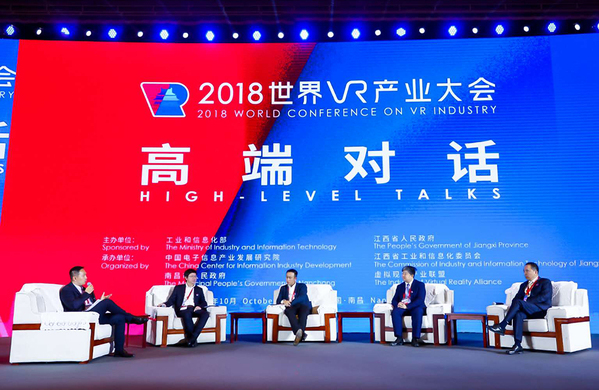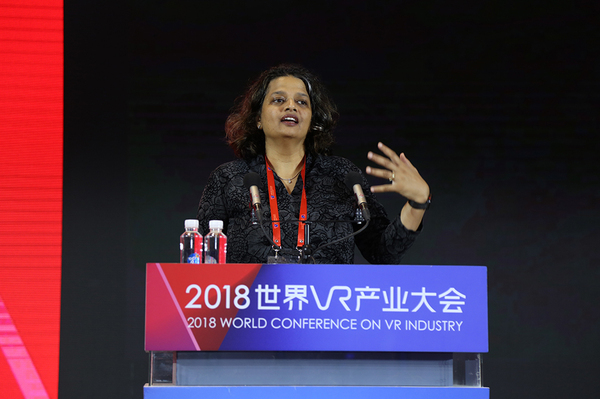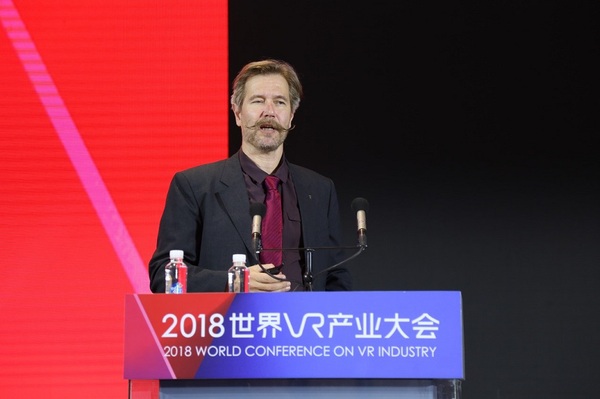The 2018 World VR Industry Conference was held in Jiangxi from October 19-21. Jointly sponsored by the Ministry of Industry and Information Technology and Jiangxi Province Government, the conference featured 14 sub-forums, including one hosted by SIST on Artificial Intelligence. Ma Yun, chairman of the Board of Directors of Alibaba Group and George Smoot, Nobel Laureate in Physics, and academician of the American Academy of Sciences attended the conference and delivered the keynote speeches. President Xi Jinping sent a congratulatory letter to the meeting.
SIST Vice Dean Yu Jingyi hosted a panel featuring Senior Vice President of Ziguang Group Co., Ltd. Wang Hongtao, Keda Xunfei CEO Hu Yu, Unity Global Vice President Zhang Junbo and others brainstormed on the status quo, prospects and respective planning and technological development characteristics of the three companies.
Professor Nadia M. Thalmann (Geneva University), who is also a life member of the Swiss Academy of Engineering Sciences, Professor Kavita Bala, chair of Cornell’s Computer Science Department, Dr. Sing Bing Kang, chief scientist at Microsoft Research, and another ten experts from academia and industry attended the conference as invited speakers.

In recent years, driven by AI technologies such as robotics, machine learning, and natural language processing, VR/AR technology has enabled all participants to become part of a computer-generated virtual reality system or an augmented reality system in which virtual information is superimposed with the real world. The final goal of this field is to perform real-time data analysis and object manipulation through natural interactions such as gestures and language. The efficient combination of AI and VR and AR technology will be widely used in medical surgery, education and training, military security, design and maintenance, film and television production, entertainment and digital culture, etc., providing new modes, methods and solutions for people's production and life.

AI-driven VR/AR technology has become a research hotspot in areas such as multi-scale high-dimensional data acquisition methods, high-dimensional data analysis based on machine learning and three-dimensional dynamics. Moreover, this technology also triggers advances in data reconstruction, VR/AR content generation software and products, as well as research on VR/AR 3D displays and optics.
Professor Kavita Bala spoke on how consumer experience will change radically due to AI, and how we can expect e-commerce and retail to be strongly influenced by the inflow of big data to online companies: consumers already use cameras and AR glasses to record their daily lives and share this information within their social networks. On the one hand, this data can help consumers find the products they need more quickly and efficiently. On the other hand, large-scale commercials can better understand the consumer interest around the world by using AR/VR technology and tools driven by AI. The audience enjoyed a number of other talks by speakers who all shared their newest research results and opinions about AI driven AR/VR from different aspects.
Aside from taking part in the forum, ShanghaiTech also had an exhibition booth at the exhibition hall, which attracted more than one thousand five hundred visitors to try VR glasses and helmet.








 沪公网安备 31011502006855号
沪公网安备 31011502006855号


